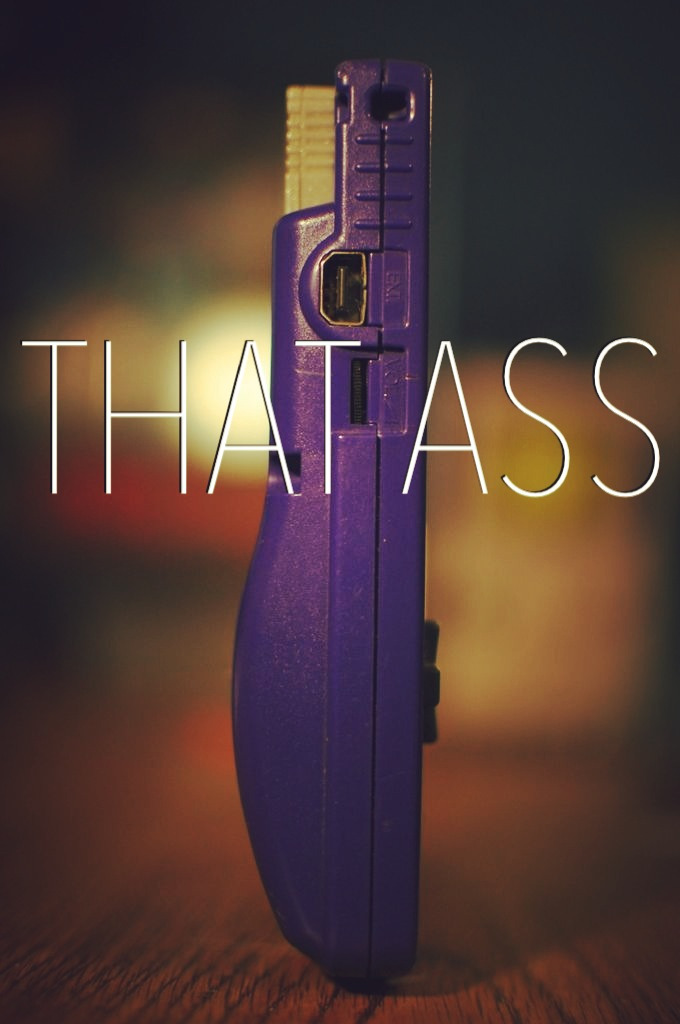 By: Allison Riley, SSH Correspondent
By: Allison Riley, SSH Correspondent
A male friend of mine posted this image on Tumblr—it’s a Game Boy Color device turned to the side. I responded and said that I take offense to this photo because of the phrase “that ass”. Whether or not we realize it consciously, placing this phrase on top of an object immediately makes us compare it to a woman; thus participating in objectification. One looks at the curved battery compartment of the Game Boy and instantly connects it to the curves of a woman’s hips. When people find images like this humorous, it shows that they are condoning behavior that is considered harassment whether they realize it or not.
A mutual friend of ours posted the following statuses on her Facebook the next day:
“To the stranger downtown: First of all, I’m not your “Honey”…Ew. Secondly, no I’m not going to holla at you just because you think I’m pretty.”
“To stranger #2 from downtown: WTF you have no right to sexually harass me with “I’d beat that” while looking me up and down. I’m a classy effing lady, not a dog meant for your sick amusement. #ugh #omgwhatisupwithtoday”
I noticed that the male friend I mentioned “liked” both of these statuses. I also know that he takes pride in calling himself a “nice guy,” yet his Tumblr post contradicted that. So I decided to give him a call. I told him to take a second look at the Game Boy photo he posted and to imagine that our friend was in the photo instead. Then would it be funny if the caption was “that ass”?
He ended up deleting the photo by the end of that week.
Then the other night, I was conversing with another male friend about gender-neutral bathrooms. He asked me if I would feel comfortable showering next to a guy. I said no because he might harass me. He replied, “What about a lesbian woman? Would you feel comfortable showering with her?”
“I already have before,” I said.
“And you don’t mind if she’s checking you out?”
“Well I know for a fact that she’s not,” I said.
“What if you didn’t know she was lesbian? Are you automatically trusting her because she’s the same sex as you?”
Generally yes, I trust women in public spaces—but mainly because none of my experiences with them thus far have been harmful to me. Only my experiences with men have been harmful; hence we say street harassment is motivated by gender.
My friend proceeded to tell me about how he has been slapped on the butt and harassed by gay men before. He has also gotten harassed by women when out alone. “I’ve had girls come up to me and basically behave like a guy,” he said. He elaborated further and we agreed that behaving “like a guy” equates actions like slapping someone’s butt, catcalling, and other unwanted gestures.
Immediately I wondered, why doesn’t he share his experience? Why don’t more guys speak up about this topic? I asked him, and he said that he simply doesn’t feel like he can. Or if he does, it won’t do anything. In reality, we all know it’s quite the opposite. It does make a difference because it will educate other men. Sharing experiences and opinions will add to the bits of information surfacing about street harassment and male socialization.
And if you ask me, true masculinity consists of taking on that positive, educational role.
When building male allies in fighting street harassment, it helps to find common ground. It helps put the seriousness of the topic into perspective. The guys with common sense will admit that they hate being harassed in public just as much as we do and hate to see us go through it.
I directed both of these guys to check out the Male Allies section of this website. On to the next!
Allison is a 2012 graduate of Metropolitan State University of Denver where she majored in Journalism with a minor in women’s studies. Follow Allison on Twitter at @a_wonderlandd.

[…] they hate being harassed in public just as much as we do and hate to see us go through it.” -Building male allies, one guy at a time, Stop Street […]